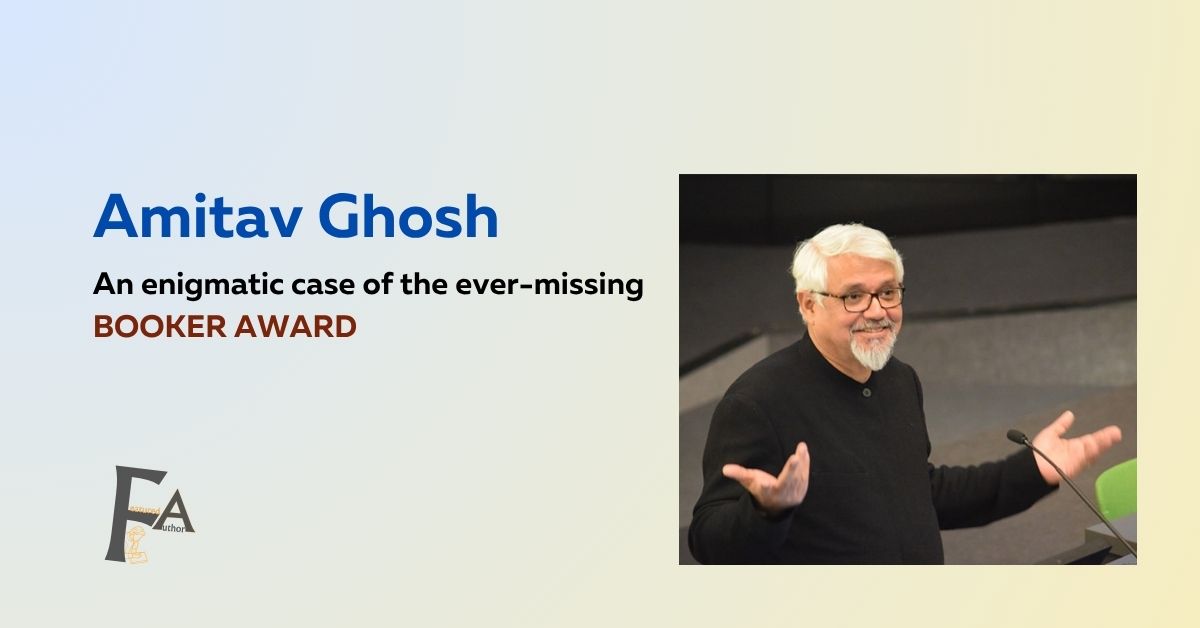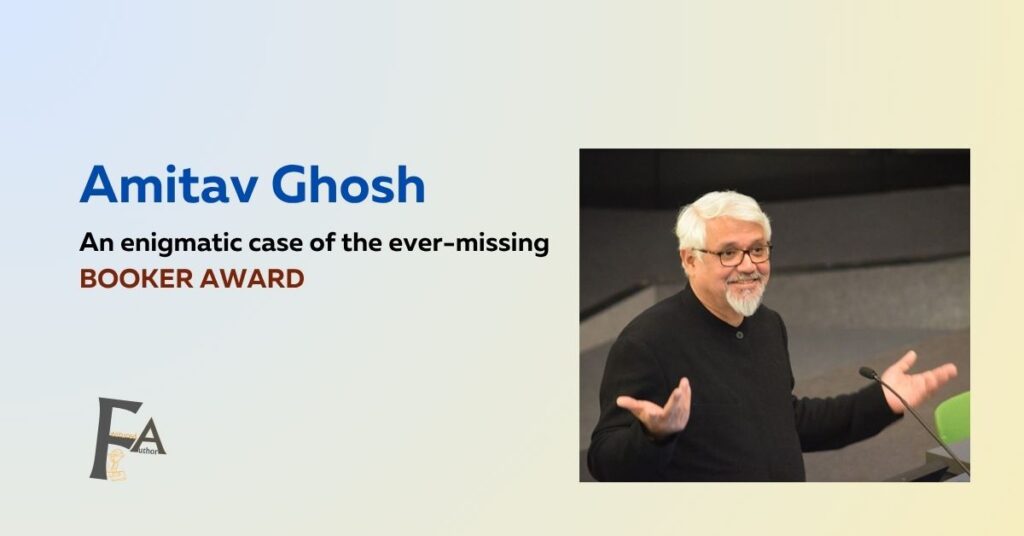Tags: #20th Century#IndianNovelists
Amitav Ghosh stands as one of the most formidable literary voices of our time—a writer whose novels are as expansive in their historical vision as they are meticulous in their craft. His works, from The Shadow Lines to the Ibis trilogy, do not merely tell stories; they excavate buried histories, interrogate colonialism’s lingering shadows, and map the interconnectedness of cultures long before “global literature” became a buzzword. And yet, despite his towering reputation among critics and a devoted international readership, Ghosh has never won the Booker Prize—an omission that grows more perplexing with each passing year. Compared to contemporaries like Kiran Desai, Aravind Adiga, or even Arundhati Roy—all Booker laureates—Ghosh’s absence from the winner’s list feels less like an oversight and more like a quiet, persistent exclusion. The question is unavoidable: Why?
One might argue that literary prizes are inherently subjective, that judging panels shift in taste, and that no single award defines a writer’s legacy. But patterns emerge when a novelist of Ghosh’s calibre—one shortlisted multiple times (The Glass Palace, Sea of Poppies)—never clinches the prize. Like many Western literary institutions, the Booker has often favoured narratives that fit a specific mould: the “Indian novel” as seen through a lens of poverty, political turmoil, or exoticised suffering. For instance, Aravind Adiga’s The White Tiger won for its searing portrayal of class struggle, while Kiran Desai’s The Inheritance of Loss explored diasporic displacement with melancholic lyricism. These brilliant novels align with a Western expectation of what “serious” Indian literature should look like—gritty, tragic, and ultimately digestible within a framework of familiar stereotypes. Ghosh’s fiction, by contrast, refuses such easy categorisation. His novels are neither sad nor triumphalist; they are vast, unruly, and intellectually demanding. The Hungry Tide does not merely depict the Sundarbans as a site of poverty, but as a contested ecological and political space where human and natural histories collide. The Calcutta Chromosome blends science fiction with colonial medical history, a narrative gamble that resists the linear realism often rewarded by prize committees.

Then there is the matter of politics—not just within Ghosh’s fiction, but around his public stance as a writer. Ghosh has never shied away from critiquing Western literary hegemony. In The Great Derangement, he argues that contemporary fiction fails to grapple with climate change because it remains trapped in individualistic, Eurocentric storytelling models. His novels, meanwhile, deliberately centre marginalised histories: the opium trade in Sea of Poppies, the refugee crises of The Shadow Lines, the ecological violence of Gun Island. These are not the themes of a writer seeking to reassure Western readers of their moral superiority; they are the works of a novelist who insists on complexity, implicating empires and economies rather than reducing history to personal epiphanies. Compare this to the reception of someone like Chetan Bhagat, whose novels thrive on simplicity and mass appeal, or even Arundhati Roy, whose The God of Small Things—while magnificent—offered a poetic, almost mythic suffering that fit neatly into a global literary market hungry for “authentic” Indian trauma. Ghosh’s refusal to sentimentalise or simplify may well be his greatest strength—and why he remains on the periphery of prize culture.
But perhaps the most damning evidence of this bias lies in the Booker’s treatment of Ghosh’s genre-defying ambition. When The Glass Palace was shortlisted in 2001, the jury reportedly debated whether its historical sweep—spanning Burma, India, and Malaysia—was “too vast” for the novel form. This is a curious critique, given that sweeping historical fiction by Western authors (Hilary Mantel, anyone?) is routinely celebrated. Similarly, the Ibis trilogy, a masterpiece of postcolonial storytelling, was never seriously considered for the Booker, possibly because its maritime, polyphonic narrative didn’t conform to the intimate, psychological realism that often dominates literary awards. It is telling that Ghosh’s closest brush with the Booker came with Sea of Poppies, the most conventionally “novelistic” of his later works—yet even then, the prize eluded him.
The juxtaposition of Amitav Ghosh’s Sea of Poppies and Aravind Adiga’s The White Tiger on the 2008 Booker shortlist presented the jury with a philosophical dilemma: Should literary excellence be measured by the scale of a novel’s ambition or the sharpness of its social critique? Ghosh’s magnum opus—a symphonic recreation of the opium trade’s devastation—was everything prize committees claim to celebrate: meticulously researched, linguistically daring, and unflinchingly moral in its indictment of colonial violence. Yet it lost to Adiga’s debut, a sleek epistolary monologue about India’s entrepreneurial underbelly. The verdict exposed more than just aesthetic preferences; it revealed how Western literary institutions reward certain kinds of Indian stories while sidelining others. The White Tiger’s victory wasn’t merely a triumph of accessibility over erudition—it was a testament to the enduring appeal of narratives that confirm, rather than complicate, the West’s vision of the Global South. Where Ghosh forced readers to confront Britain’s role in addicting millions of Chinese to opium (a historical crime still rarely taught in British schools), Adiga gave them Balram Halwai, a murderous chauffeur whose rise mirrored Western stereotypes of India as a land of cunning self-made men and systemic rot. The jury, chaired by a Conservative politician, may not have consciously rejected Ghosh’s anti-colonial thesis. Still, their choice perpetuated an old asymmetry: postcolonial nations are applauded for self-laceration but seldom for holding mirrors to their former oppressors.
Ghosh’s omission is poignant because Sea of Poppies exemplifies the novel’s highest calling—to resurrect buried histories with intellectual rigour and emotional grandeur. The Ibis, his repurposed slave ship, becomes a microcosm of the empire’s hypocrisies, carrying indentured labourers alongside opium bales while British officers spout civilising rhetoric. Compare this to The White Tiger’s Delhi traffic jams and corrupt politicians: Adiga’s India is visceral and contemporary but comfortably familiar to Western audiences raised on Slumdog Millionaire and poverty tourism. Ghosh’s tragedy is that he was penalised for his virtues—his refusal to simplify history’s ambiguities, his insistence on giving voice to 19th-century Bhojpuri peasants and lascars alongside colonial administrators. Like many prizes, the Booker often mistakes narrative restraint for depth, rewarding tightly wound parables over sprawling, messy humanity. When Michael Portillo praised The White Tiger for being “shocking,” he unwittingly highlighted the jury’s bias toward performative grit over substantive reckoning. Ghosh’s characters—Deeti, the opium widow forging new kinships, or Neel, the zamindar reduced to coolie—embody resilience; Adiga’s Balram embodies a Western neoliberal fantasy of upward mobility through amorality. That the judges chose the latter suggests how even progressive literary circles remain wedded to reductive visions of “authentic” Indianness—ones that privilege poverty porn over postcolonial memory, individual cunning over systemic critique. Ghosh’s real misfortune wasn’t losing to Adiga; it was having his masterpiece judged by a panel unequipped to recognise that the most urgent stories aren’t always the loudest ones.
One cannot ignore the subtle hierarchies of literary prestige that govern these decisions. Writers like Salman Rushdie and V.S. Naipaul, for all their brilliance, have often been framed as “global” authors, their Indianness secondary to their cosmopolitanism. Ghosh, by contrast, remains insistently rooted in South Asia even as his narratives span continents. His characters—Deeti, Neel, Kanai Dutt—are not exiles or migrants in the Naipaulian sense; they are people whose lives are shaped by the subcontinent’s turbulent history, yet whose stories refuse to be contained by it. This, too, may unsettle prize juries accustomed to either “world literature” that flattens cultural specificity or “Indian literature” that performs its identity for Western consumption.
The irony, of course, is that Ghosh’s novels are precisely what the literary world claims to want: ambitious, erudite, and fiercely original. His prose, at once lyrical and precise, has the rare quality of making history feel urgently present. His research is impeccable, yet never burdensome; his plots are intricate yet contrived. And his themes—migration, ecology, the legacies of empire—could not be more timely. That he has not been deemed “Booker-worthy” says less about his work than the unspoken rules of literary validation. It suggests that even now, certain Indian stories are preferred over others: those that confirm, rather than challenge, the West’s vision of the East.
Amitav Ghosh does not write for awards. He writes that literature is an act of recovery, a way of stitching together what history has torn apart. But the continued reluctance to honour him with the Booker raises uncomfortable questions about who gets to define literary greatness—and why. Perhaps, in the end, his exclusion is the most telling recognition of all: proof that his work is too expansive, too defiant, too bright to fit neatly into the shadows where prize culture often dwells.
Related Links:
Amitav Ghosh (a detailed biography)
Aravind Adiga (a detailed biography)
by Chitra for Featured Author
…
